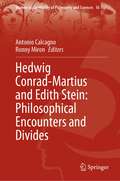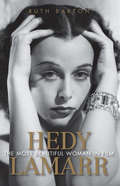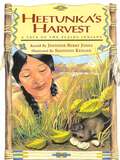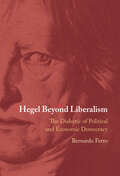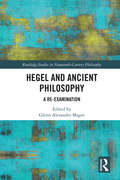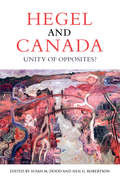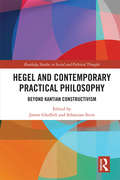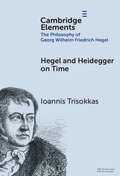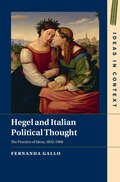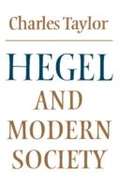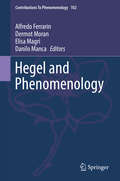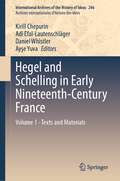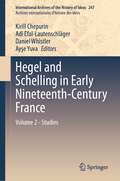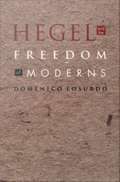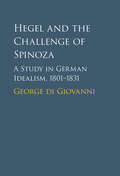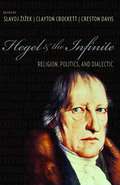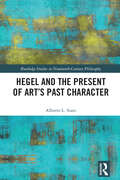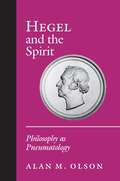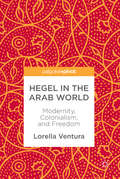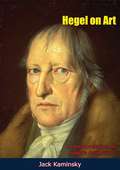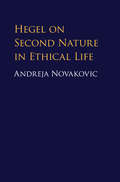- Table View
- List View
Hedwig Conrad-Martius and Edith Stein: Philosophical Encounters and Divides (Women in the History of Philosophy and Sciences #16)
by Antonio Calcagno Ronny MironThis book focuses on the unique philosophical relationship between Hedwig Conrad-Martius and Edith Stein. The two phenomenologists discussed and debated insights and ideas about the nature of the soul, phenomenology, personhood and individuality, animal life, nature, being, and God. This book brings together for the first time leading international scholars of phenomenology to explore the philosophical exchange between both Conrad-Martius and Stein. This is an important book for understanding the development of the phenomenological movement and key phenomenological ideas and methods. It provides a critical and comprehensive overview of the key issues that helped frame both phenomenologists’ philosophical trajectories. Additionally, the ideas of Conrad-Martius and Stein are mined to address contemporary questions surrounding such topics as personal identity, animal versus human personhood, contemporary atheism, and the relationship between religion and science. The book will have great appeal to phenomenologists, philosophers, and historians of philosophy.
Hedy Lamarr: The Most Beautiful Woman in Film (Screen Classics)
by Ruth BartonThis true story of a Hollywood sex symbol&’s tumultuous life is &“a real page-turner. Now, here is a book that would make a great movie&” (London Daily Mail). Hedy Lamarr&’s life was punctuated by salacious rumors and public scandal, but it was her stunning looks and classic Hollywood glamour that continuously captivated audiences. Born Hedwig Kiesler, she escaped an unhappy marriage with arms dealer Fritz Mandl in Austria to try her luck in Hollywood, where her striking appearance made her a screen legend. Her notorious nude role in the erotic Czech film Ecstasy, as well as her work with Cecil B. DeMille (Samson and Delilah), Walter Wanger (Algiers), and studio executive Louis B. Mayer catapulted her alluring and provocative reputation as a high-profile sex symbol. In this biography, Ruth Barton explores the many facets of the screen legend—including her life as an inventor. Working with avant-garde composer and film scorer George Antheil, Lamarr helped to develop and patent spread spectrum technology, which is still used in mobile phone communication. However, despite her screen persona and scientific success, Lamarr&’s personal life included a string of failed marriages, a lawsuit against her publisher regarding her sensational autobiography, and shoplifting charges that made her infamous beyond her celebrity. Drawing on extensive research into both the recorded truths of Lamarr&’s life and the rumors that made her notorious, Barton recognizes Lamarr&’s contributions to both film and technology while revealing the controversial and conflicted woman underneath.
Heetunka's Harvest: A Tale of the Plains Indians
by Jennifer Berry JonesA retelling of a Sioux legend recounts how a woman learns a lesson about selfishness when she take beans from Heetunka the mouse without leaving a gift in return, and so brings the wrath of the gods down on herself.Ages 5 to 12
Hegel
by Charles TaylorThis is a major and comprehensive study of the philosophy of Hegel, his place in the history of ideas, and his continuing relevance and importance. Professor Taylor relates Hegel to the earlier history of philosophy and, more particularly, to the central intellectual and spiritual issues of his own time. He engages with Hegel sympathetically, on Hegel's own terms and, as the subject demands, in detail. This important book is now reissued with a fresh new cover.
Hegel Beyond Liberalism: The Dialectic of Political and Economic Democracy
by Bernardo FerroHegel's political philosophy has long been associated with some form of social or welfare liberalism. Bernardo Ferro challenges this interpretation and shows how Hegel's work harbours a more ambitious philosophical project, pointing to a different vision of modern society. Ferro argues that Hegel's account of the state should be read not as a complement to the concept of civil society, but as a direct challenge to its underlying logic. He then draws the political and economic conclusions implicit in this line of approach, arguing that the conscious pursuit of the common good which Hegel regards as essential to a rational state is not compatible with either a capitalist production system or a constitutional monarchy: a true dialectical synthesis of the particular interests of individuals and the general interests of society entails nothing less than a comprehensive democratization of the economic and the political spheres, and the need for this transformation holds the key to Hegel's enduring political relevance.
Hegel and Ancient Philosophy: A Re-Examination (Routledge Studies in Nineteenth-Century Philosophy)
by Glenn Alexander MageeHegel’s debts to ancient philosophy are widely acknowledged by scholars, and by the philosopher himself. Roughly half of his Lectures on the History of Philosophy is devoted to ancient philosophy, and throughout his work Hegel frequently frames his positions in relation to the thinkers and movements of antiquity. This volume presents original essays from leading scholars dealing with Hegel’s debts to ancient thinkers, as well as his own, often problematic readings of ancient philosophy. While around half of the chapters discuss Hegel’s treatment of Aristotle—a topic that has long been at the forefront of scholarship—the other half explore his relationship to such ancient figures as Xenophanes, Anaxagoras, Socrates, Plato, Sextus Empiricus, and the Stoics. The essays challenge a number of longstanding scholarly assumptions regarding, for example, Hegel’s denigration of the "mythical," his developmentalist approach to ancient thought, his conception of the state in relation to the Greek polis, his "hermeneutic" of the Platonic dialogues, and his use of Aristotelian concepts in arguments concerning the psyche, the body, and their unity and distinction.
Hegel and Canada: Unity of Opposites?
by Susan Dodd Neil G. RobertsonHegel has had a remarkable, yet largely unremarked, role in Canada's intellectual development. In the last half of the twentieth-century, as Canada was coming to define itself in the wake of World War Two, some of Canada’s most thoughtful scholars turned to the work of G.W.F. Hegel for insight. Hegel and Canada is a collection of essays that analyses the real, but under-recognized, role Hegel has played in the intellectual and political development of Canada. The volume focuses on the generation of Canadian scholars who emerged after World War Two: James Doull, Emil Fackenheim, George Grant, Henry S. Harris, and Charles Taylor. These thinkers offer a uniquely Canadian view of Hegel's writings, and, correspondingly, of possible relations between situated community and rational law. Hegel provided a unique intellectual resource for thinking through the complex and opposing aspects that characterize Canada. The volume brings together key scholars from each of these five schools of Canadian Hegel studies and provides a richly nuanced account of the intellectually significant connection of Hegel and Canada.
Hegel and Contemporary Practical Philosophy: Beyond Kantian Constructivism (Routledge Studies in Social and Political Thought)
by Sebastian Stein James GledhillWhile Kantian constructivism has become one of the most influential and systematic schools of thought in analytic moral and political philosophy, Hegelian approaches to practical normativity hold out the promise of building upon Kantian insights into individual self-determination while avoiding their dualistic tendencies. James Gledhill and Sebastian Stein unite distinguished scholars of German idealism and contemporary Anglophone practical philosophy with rising stars in the field, to explore whether Hegelian idealist philosophy can offer the categories that analytic practical philosophy requires to overcome the contradictions that have so far plagued Kantian constructivism. The volume organizes the contributions into three parts. The first of these engages debates in metaethics regarding the relationship between realism and constructivism. The second part sees contributors draw on debates about the nature of political normativity, focusing primarily on the problems of historical contextualism, relativism, and critical reflection. The concluding part considers the application of the Hegelian framework to contemporary debates about specific ethical issues, including multiculturalism, democracy, and human rights. Hegel and Contemporary Practical Philosophy contributes to the on-going debate about the importance of systematic philosophy in the context of practical philosophy, engages with contemporary discussions about the shape of a rational social order, and gauges the timeliness of Hegelian philosophy. This book is a must read for scholars interested in Hegel and in the contemporary tradition of Kantian constructivism in moral and political philosophy.
Hegel and Heidegger on Time (Elements in the Philosophy of Georg Wilhelm Friedrich Hegel)
by Ioannis TrisokkasThis Element discusses Heidegger's early (1924–1931) reading and critique of Hegel, which revolve around the topic of time. The standard view is that Heidegger distances himself from Hegel by arguing that whereas he takes time to be 'originarily' Dasein's 'temporality,' Hegel has a 'vulgar' conception of time as 'now-time' (the succession of formal nows). The Element defends the thesis that while this difference concerning the nature of time is certainly a part of Heidegger's 'confrontation' with Hegel, it is not its kernel. What Heidegger aspired to convey with his Hegel-critique is that they have a divergent conception of man's understanding of being (ontology). Whereas Heidegger takes ontology to be grounded in temporality, Hegel thinks it is grounded in 'the concept,' which has a dimension ('logos') manifesting eternity or timelessness. It is argued, contra Kojève, that Heidegger's reading (but not necessarily his critique) of Hegel is, in an important respect, correct.
Hegel and Italian Political Thought: The Practice of Ideas, 1832–1900 (Ideas in Context)
by Fernanda GalloAcross Italy in the nineteenth century, a generation of intellectuals engaged with Hegel's philosophy while actively participating in Italian political life. Hegel and Italian Political Thought traces the reception and transformation of these ideas, exploring how Hegelian concepts were reworked into political practices by Italians who had participated in the 1848 revolution, who would lead the new Italian State after unification, and who would continue to play a central role in Italian politics until the end of the century. Fernanda Gallo investigates the particular features of Italian Hegelianism, demonstrating how intellectuals insisted on the historical and political dimension of Hegel's idealism. Set apart from the broader European reception, these thinkers presented a critical Hegelianism closer to practice than ideas, to history than metaphysics. This study challenges conventional hierarchies in the study of Italian political thought, exploring how the ideas of Hegel acquired newfound political power when brought into connection with their specific historical context.
Hegel and Modern Society
by Charles TaylorDiscussion of Hegel's contributions to philosophy and modernity
Hegel and Phenomenology (Contributions to Phenomenology #102)
by Dermot Moran Alfredo Ferrarin Elisa Magrì Danilo MancaThis volume articulates and develops new research questions and original insights regarding the philosophical dialogue between Hegel’s philosophy, his heritage, and contemporary phenomenology, including, among others, Husserl, Heidegger, Merleau-Ponty, and Ricoeur. The collection discusses methodological questions concerning the relevance of Hegel’s philosophy for contemporary phenomenology, addressing core issues revolving around the key concepts of history, being, science, subjectivity, and dialectic. The volume fills a gap in historiography, expanding the knowledge of the impact of Hegel's philosophy on contemporary philosophy and raising new questions on the transformation of transcendental philosophy in post-Kantian philosophy. The contributions gathered in this volume shed new light on issues related to the problem of scientific method in philosophy, on the philosophy of history, as well as on the dimension of subjectivity. By providing critical insights into Hegel’s philosophy and contemporary phenomenology, the book opens up new research perspectives recommended to philosophers and scholars of different traditions, especially classical German philosophy, phenomenology, and history of Western philosophy.
Hegel and Schelling in Early Nineteenth-Century France: Volume 1 - Texts and Materials (International Archives of the History of Ideas Archives internationales d'histoire des idées #246)
by Daniel Whistler Kirill Chepurin Adi Efal-Lautenschläger Ayşe YuvaHegel and Schelling in Early Nineteenth-Century France is a two-volume work that documents the French reception of G. W. F. Hegel and F. W. J. Schelling from 1801 to 1848. It shows that the story of the "French Hegel" didn't begin with Wahl and Kojève by giving readers a solid understanding of the various ways in which German Idealism impacted nineteenth-century French philosophy, as well as providing the first ever English-language translations of excerpts from the most important philosophical texts of the era. Inside volume one, readers will find a number of interpretative frameworks to help them get to grips with this neglected field in the history of ideas. In addition to excerpted translations and a narrative of Hegel’s and Schelling’s fate in France during the early nineteenth century, this volume includes an introduction on transnational reception history, as well as an analytical catalogue of the translations of their work produced in French at this time, of the publications which appropriated or interrogated their philosophical legacy, and of the journals, institutional structures and other mechanisms of dissemination that brought Hegel’s and Schelling’s philosophy into France. The book thus details the ways in which French philosophers of the period took up the debates and concepts of German Idealism, transformed them or rejected them. In this way, it aims to contribute to a reversal of the serious neglect of early nineteenth-century French thought in English-language scholarship and, in so doing, goes beyond a nation-based narrative of the history of philosophy. Figures covered in the volumes include major philosophers such as Cousin, Leroux, Proudhon, Quinet, Ravaisson, Renouvier and Véra, as well as more neglected figures, like Barchou de Penhoën, Bénard, Lèbre, Lerminier, Pictet, and Willm.
Hegel and Schelling in Early Nineteenth-Century France: Volume 2 - Studies (International Archives of the History of Ideas Archives internationales d'histoire des idées #247)
by Daniel Whistler Kirill Chepurin Adi Efal-Lautenschläger Ayşe YuvaHegel and Schelling in Early Nineteenth-Century France is a two-volume work that documents the French reception of G. W. F. Hegel and F. W. J. Schelling from 1801 to 1848. It shows that the story of the "French Hegel" didn't begin with Wahl and Kojève by giving readers a solid understanding of the various ways in which German Idealism impacted nineteenth-century French philosophy, as well as providing the first ever English-language translations of excerpts from the most important philosophical texts of the era. Inside volume two, readers will find a series of scholarly studies to help them get to grips with this neglected field in the history of ideas. The contributors are world-leading and emerging experts from Europe, UK, and North America. They highlight the stakes and trace the pathways of this reception for French and German thought during the period, including the ways in which French philosophers of the period took up the debates and concepts of German Idealism, transformed them or rejected them. In this way, the volume aims to redress the serious neglect of early nineteenth-century French thought in English-language scholarship and, in so doing, goes beyond a nation-based narrative of the history of philosophy. Figures covered in the volumes include major philosophers such as Cousin, Leroux, Proudhon, Quinet, Ravaisson, Renouvier and Véra, as well more neglected figures, like Barchou de Penhoën, Bénard, Lèbre, Lerminier, Pictet, and Willm.
Hegel and The Freedom of Moderns
by Domenico LosurdoAvailable in English for the first time, Hegel and the Freedom of Moderns revives discussion of the major political and philosophical tenets underlying contemporary liberalism through a revolutionary interpretation of G. W. F. Hegel's thought. Domenico Losurdo, one of the world's leading Hegelians, reveals that the philosopher was fully engaged with the political controversies of his time. In so doing, he shows how the issues addressed by Hegel in the nineteenth century resonate with many of the central political concerns of today, among them questions of community, nation, liberalism, and freedom. Based on an examination of Hegel's entire corpus--including manuscripts, lecture notes, different versions of texts, and letters--Losurdo locates the philosopher's works within the historical contexts and political situations in which they were composed. Hegel and the Freedom of Moderns persuasively argues that the tug of war between "conservative" and "liberal" interpretations of Hegel has obscured and distorted the most important aspects of his political thought. Losurdo unravels this misleading dualism and provides an illuminating discussion of the relation between Hegel's political philosophy and the thinking of Karl Marx and Friedrich Engels. He also discusses Hegel's ideas in relation to the pertinent writings of other major figures of modern political philosophy such as Jean-Jacques Rousseau, John Locke, Edmund Burke, John Stuart Mill, Jeremy Bentham, Karl Popper, Norberto Bobbio, and Friedrich Hayek.
Hegel and the Challenge of Spinoza: A Study in German Idealism, 1801–1831
by George di GiovanniHegel and the Challenge of Spinoza explores the powerful continuing influence of Spinoza's metaphysical thinking in late eighteenth- and early nineteenth-century German philosophy. George di Giovanni examines the ways in which Hegel's own metaphysics sought to meet the challenges posed by Spinoza's monism, not by disproving monism, but by rendering it moot. In this, di Giovanni argues, Hegel was much closer in spirit to Kant and Fichte than to Schelling. This book will be of interest to students and researchers interested in post-Kantian Idealism, Romanticism, and metaphysics.
Hegel and the Infinite: Religion, Politics, and Dialectic (Insurrections: Critical Studies in Religion, Politics, and Culture)
by Creston Davis Slavoj Clayton Crockett Eds. iekCatherine Malabou, Antonio Negri, John D. Caputo, Bruno Bosteels, Mark C. Taylor, and Slavoj Zizek join seven others—including William Desmond, Katrin Pahl, Adrian Johnston, Edith Wyschogrod, and Thomas A. Lewis—to apply Hegel's thought to twenty-first-century philosophy, politics, and religion. Doing away with claims that the evolution of thought and history is at an end, these thinkers safeguard Hegel's innovations against irrelevance and, importantly, reset the distinction of secular and sacred.These original contributions focus on Hegelian analysis and the transformative value of the philosopher's thought in relation to our current "turn to religion." Malabou develops Hegel's motif of confession in relation to forgiveness; Negri writes of Hegel's philosophy of right; Caputo reaffirms the radical theology made possible by Hegel; and Bosteels critiques fashionable readings of the philosopher and argues against the reducibility of his dialectic. Taylor reclaims Hegel's absolute as a process of infinite restlessness, and Zizek revisits the religious implications of Hegel's concept of letting go. Mirroring the philosopher's own trajectory, these essays progress dialectically through politics, theology, art, literature, philosophy, and science, traversing cutting-edge theoretical discourse and illuminating the ways in which Hegel inhabits them.
Hegel and the Metaphysics of Absolute Negativity
by Brady BowmanHegel's doctrines of absolute negativity and 'the Concept' are among his most original contributions to philosophy and they constitute the systematic core of dialectical thought. Brady Bowman explores the interrelations between these doctrines, their implications for Hegel's critical understanding of classical logic and ontology, natural science and mathematics as forms of 'finite cognition', and their role in developing a positive, 'speculative' account of consciousness and its place in nature. As a means to this end, Bowman also re-examines Hegel's relations to Kant and pre-Kantian rationalism, and to key post-Kantian figures such as Jacobi, Fichte and Schelling. His book draws from the breadth of Hegel's writings to affirm a robustly metaphysical reading of the Hegelian project, and will be of great interest to students of Hegel and of German Idealism more generally.
Hegel and the Present of Art’s Past Character (Routledge Studies in Nineteenth-Century Philosophy)
by Alberto L. SianiThis book reclaims Hegel’s notion of the “end of art”—or, more precisely, of “art’s past character”—not just as a piece of the history of philosophy but as a living critical and interpretive methodology. It addresses the presence of the past character of art both in Hegel and contemporary philosophy and aesthetics. The book’s innovative contribution lies in unifying the Hegelian thesis with discussions of contemporary art and philosophy. The author not only offers a Hegelian exegesis but applies the idea of the past character of art to themes that are both related to Hegel’s philosophy, such as the French Revolution and the modern state, Kantian aesthetics, and religion and the sacred space disclosed for art, and going beyond Hegel, such as Celan's poetry, Gramsci's criticism of Croce, human rights, and even the grunge rock band Pearl Jam. Conversely, such non-Hegelian explorations will help enlighten what may look like a specific thread of Hegel’s aesthetics, but can be used to shed light on some core motives of his philosophy. The author’s interpretation of art’s past character reclaims the full value, attractiveness, and philosophical soundness of Hegel’s thesis, while rejecting its interpretation in terms of a complete dissolution of the aesthetic element into the philosophical one. Hegel and the Present of Art’s Past Character will be of interest to scholars and advanced students working on Hegel, philosophy of art and aesthetics, history of philosophy, political philosophy, and art theory.
Hegel and the Present of Art’s Past Character (Routledge Studies in Nineteenth-Century Philosophy)
by Alberto L. SianiThis book reclaims Hegel’s notion of the “end of art”—or, more precisely, of “art’s past character”—not just as a piece of the history of philosophy but as a living critical and interpretive methodology. It addresses the presence of the past character of art in both Hegel and contemporary philosophy and aesthetics. The book’s innovative contribution lies in unifying the Hegelian thesis with discussions of contemporary art and philosophy. The author not only offers a Hegelian exegesis but also applies the idea of the past character of art to themes that are related to both Hegel’s philosophy, such as the French Revolution and the modern state, Kantian aesthetics, and religion and the sacred space disclosed for art, and going beyond Hegel, such as Celan's poetry, Gramsci's criticism of Croce, human rights, and even the grunge rock band Pearl Jam. Conversely, such non-Hegelian explorations will help enlighten what may look like a specific thread of Hegel’s aesthetics, but can be used to shed light on some core motives of his philosophy. The author’s interpretation of art’s past character reclaims the full value, attractiveness, and philosophical soundness of Hegel’s thesis, while rejecting its interpretation in terms of a complete dissolution of the aesthetic element into the philosophical one. Hegel and the Present of Art’s Past Character will be of interest to scholars and advanced students working on Hegel, philosophy of art and aesthetics, history of philosophy, political philosophy, and art theory.
Hegel and the Spirit: Philosophy as Pneumatology
by Alan M. OlsonHegel and the Spirit explores the meaning of Hegel's grand philosophical category, the category of Geist, by way of what Alan Olson terms a pneumatological thesis. Hegel's philosophy of spirit, according to Olson, is a speculative pneumatology that completes what Adolf von Harnack once called the "orphan doctrine" in Christian theology--the doctrine of the Holy Spirit. Olson argues that Hegel's development of philosophy as pneumatology originates out of a deep appreciation of Luther's dialectical understanding of Spirit and that Hegel's doctrine of Spirit is thus deeply interfused with the values of Würtemberg Pietism. Olson further maintains that Hegel's Enzyklopdie is the post-Enlightenment philosophical equivalent of a Trinitätslehre and that his Rechtsphilosophie is an ecclesiology. Thus Hegel and the Spirit demonstrates the truth of Karl Barth's observation that Hegel is the potential Aquinas of Protestantism. Exploring Hegel's philosophy of spirit in historical, cultural, and personal religious context, the book identifies Hegel's relationship with Hölderlin and his response to Hölderlin's madness as key elements in the philosopher's religious and philosophical development, especially with respect to the meaning of transcendence and dialectic.
Hegel in the Arab World: Modernity, Colonialism, And Freedom
by Lorella VenturaHegel's philosophy has been of fundamental importance for the development of contemporary thought and for the very representation of Western modernity. This book investigates Hegel’s influence in the Arab world, generally considered "other" and far from the West, focusing specifically on Syria, Lebanon, and Egypt. Lorella Ventura discusses the reception of Hegelian thought and outlines a conceptual grid to help interpret the historical, cultural, and political events that have affected the Arab region in the last two centuries, and shed light on some aspects of its complex relationship with the western world.
Hegel on Art: An Interpretation on Hegel’s Aesthetics
by Jack KaminskyProfessor Kaminsky’s lucid exposition is, surprisingly, the first attempt in English to deal extensively and critically with Hegel’s views on art, as outlined in his difficult volumes on that subject. Hegel on Art thus performs a needed service for those interested in either the philosophy or the history of the fine arts.Hegel’s idealistic metaphysics was the last European endeavor to construct a universal philosophical system on the traditional pattern, and to modern readers it can easily appear more imposing than useful. But in his examination of art, according to Professor Kaminsky, the German philosopher became “the most empirical of the empiricists,” and his observations can be valuable to us quite independent of our commitment to his metaphysics.Moreover, as Professor Kaminsky shows, Hegel’s metaphysical framework does give him an advantage not available under the rigorous skepticism of today’s positivist or symbolist: he can recognize that art mirrors the world of action, and so can provide it with objective validity. As the author concludes in Hegel’s defense: “It may well be that only art can be used to communicate the important episodes that happen to us or others....Without art, we lose one of our great sources of information as to who we are and what we ought to do.”“[Kaminsky] succeeds in the difficult task of summarizing Hegel’s aesthetics in a clear, well-balanced text which follows the historical lines set down by the philosopher. His work is the most extensive study of the subject available in English.”—Library Journal
Hegel on Philosophy in History
by Rachel Zuckert James KreinesIn this volume honouring Robert Pippin, prominent philosophers such as John McDowell, Slavoj Žižek, Jonathan Lear, and Axel Honneth explore Hegel's proposals concerning the historical character of philosophy. Hegelian doctrines discussed include the purported end of art, Hegel's view of human history, including the history of philosophy as the history of freedom (or autonomy), and the nature of self-consciousness as realized in narrative or in action. Hegel scholars Rolf-Peter Horstmann, Sally Sedgwick, Terry Pinkard, and Paul Redding attempt to vindicate some of Hegel's claims concerning historical philosophical progress, while others such as Robert Stern, Christoph Menke, and Jay Bernstein suggest that Hegel either did not conceive of philosophy as progressing unidirectionally or did not make good on his claims to progress: perhaps we should still be Aristotelians in ethics, or perhaps we are still torn between sensibility and reason, or between individuality and social norms. Perhaps capitalism has exacerbated such problems.
Hegel on Second Nature in Ethical Life
by Andreja NovakovicWhat does it take to be subjectively free in an objectively rational social order? In this book Andreja Novakovic offers a fresh interpretation of Hegel's account of ethical life by focusing on his concept of habit or 'second nature'. Novakovic addresses two central and difficult issues facing any interpretation of his Philosophy of Right: why Hegel thinks that it is is better to relate unreflectively to the laws of ethical life, and which forms of reflection, especially critical reflection, remain available within ethical life. Her interpretation draws on numerous parts of Hegel's system, particularly on his 'Anthropology' and his Phenomenology of Spirit, and also explores connections between his account and those of other philosophers. Her aim is to argue that Hegel has a compelling conception of the ordinary ethical standpoint which takes seriously both the virtues and the perils of reflection.
